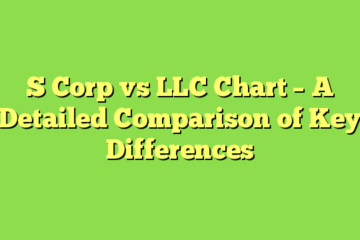Are you wondering if can an S Corp Own an LLC (Limited Liability Company)? This is a common question for entrepreneurs looking to expand their businesses. The short answer is yes, an S corp can own an LLC.
Yes, an S corporation can own a limited liability company (LLC). An S corp is a legal business entity, so it is allowed to purchase membership interests in an LLC. Owning an LLC provides benefits like liability protection, business expansion, and estate planning. However, there are important tax considerations like pass-through income treatment and payroll taxes that must be handled properly. Overall, with the right business reasons and tax planning, an S corp can utilize LLCs as part of its entity structure.
An S corporation is a legal business structure that elects pass-through taxation. This means the business profits pass through to the owners’ personal tax returns. An LLC is a flexible legal structure that provides liability protection for the owners. Since an S corp is a legal entity, it can own membership interests in an LLC.
There are several reasons an S corp may want to own an LLC subsidiary. The LLC provides added liability protection, flexibility in profit distributions, and opportunities for business expansion. However, there are also important tax considerations when an S corp owns an LLC that business owners should understand.
What is an S Corporation?
An S corporation, or S corp, is a standard corporation formed at the state level that elects a special tax status with the IRS. Essentially, it allows the corporation to be taxed similarly to a partnership or sole proprietorship.
The profits of an S corp pass through to the shareholders’ personal tax returns. The business itself does not pay taxes on the income. This avoids the double taxation issue that applies to regular C corporations.
To qualify for S corp status, the business must meet the following requirements:
- Have 100 or fewer shareholders
- Have only one class of stock
- Have shareholders who are U.S. citizens or residents
- Only have shareholders who are individuals, estates, trusts, or exempt organizations (no other business entities)
S corps provide liability protection and allow shareholders to actively manage the company. The ownership restrictions prevent complex joint ventures between entities.
What is an LLC?
A limited liability company, or LLC, is a flexible legal structure that combines aspects of partnerships and corporations. LLCs provide personal liability protection for the owners, called members.
LLCs do not have the same restrictions on ownership that apply to S corps. An LLC can have an unlimited number of members, and those members can be individuals or other business entities.
Profits and losses of an LLC pass through to the owners’ personal tax returns by default. However, an LLC can elect to be taxed as a C corporation if desired.
LLCs allow great flexibility in structuring ownership stakes and profit/loss distributions. Members can divide profits disproportionately based on different ownership and management factors.
Can an S Corp Own an LLC?
Yes, an S corporation can own an LLC. An LLC is allowed to have another business entity as a member owner. Since an S corp is a legal entity, it can purchase membership interests in an LLC.
However, an LLC cannot own an S corp in most cases. The only exception is a single-member LLC taxed as a disregarded entity, where the sole owner meets all S corp shareholder requirements.
When an S corp owns an LLC, the LLC remains a pass-through entity. Its profits pass through to the S corp owners rather than being taxed at the entity level.
There are no restrictions on the number of LLCs an S corp can own. It can be the sole member or a partial member with other owners.
Why Would an S Corp Own an LLC?
There are several key reasons an S corp may want to own an LLC subsidiary:
Asset Protection
Forming an LLC under the ownership of the S corp provides enhanced protection for valuable business assets. If the parent S corp gets sued or has creditors make claims, the LLC assets are generally protected.
Business Expansion
Expanding into new markets or testing new products/services can be achieved by housing them within a subsidiary LLC rather than the main S corp entity.
Estate Planning
Holding assets like real estate in an LLC rather than directly can provide estate planning benefits. LLC assets may receive valuation discounts and avoid probate.
Flexible Profit Distribution
S corps must distribute profits according to share ownership. But subsidiary LLCs can allocate profits based on management roles, sweat equity, and other factors.
Tax Considerations for an S Corp Owning an LLC
While an S corp can own an LLC, there are some key tax considerations to keep in mind:
- The LLC remains a pass-through entity, so its profits will flow through to the S corp owners’ tax returns. No profits are taxed at the entity level.
- Any profits distributed from the LLC to the S corp still must follow S corp distribution rules based on ownership percentages.
- Owners must track passive income from LLCs separately from active business income for certain tax calculations.
- Payroll and employment tax rules still apply for any LLC employees, including owner-employees.
- LLCs may be subject to state fees and franchise taxes that differ from S corps.
Conclusion
In summary, S corporations can own LLCs to help limit liability exposure, divide up business activities, and gain some operational flexibility. However, it is crucial to follow tax rules carefully, track income sources, and meet filing requirements correctly.
Consulting with tax and legal experts when structuring S corp ownership of LLCs can help put your business in the best position. Careful planning of your entity structure and staying compliant with regulations will support future growth.
Frequently Asked Questions (FAQs)
1. Can an S corp be a member of multiple LLCs?
Yes, there is no limit on the number of LLCs an S corp can have membership in. It can be the sole member or a partial member in multiple LLCs.
2. Can an S corp own a single-member LLC?
Yes, an S corp can be the sole member of a single-member LLC. The LLC income would pass through and be reported by the S corp owners.
3. Can ownership of an LLC jeopardize S corp status?
No, ownership of an LLC does not affect S corp status in and of itself. However, any unallowed shareholders in the parent S corp could trigger termination.
4. How are profits from an S corp-owned LLC taxed?
The LLC remains a pass-through entity, so its profits flow through to the S corp return and its owners. No tax is paid at the LLC level.
5. Can an LLC elect S corp status if owned by an S corp?
No, an LLC owned by an S corp cannot make an S corp election. It remains a pass-through LLC. Only corporations and certain banks/insurers can elect S corp status.
References:
- https://www.irs.gov/forms-pubs/about-form-2553
- https://www.brookings.edu/research/9-facts-about-pass-through-businesses/
- https://www.irs.gov/businesses/small-businesses-self-employed/s-corporations
- https://www.investopedia.com/terms/s/sweatequity.asp
- https://www.irs-ein-tax-id.com/learn/faq/what-is-an-entity-type/

Aisha Noreen is an owner of a small business with more than 9 years of experience in the marketing industry. With the wisdom of an old soul, she always seeks innovation and mind-blowing ROI techniques. Her unique approach helped many small businesses thrive and she can surprise you in many ways as well. Believe it or not, her energy, passion, and creativity are contagious enough to transform your business and take it to another level.







